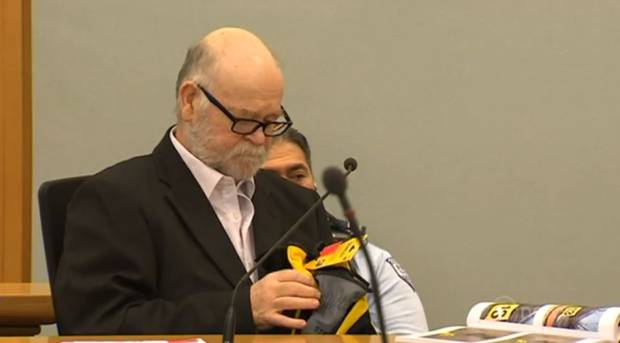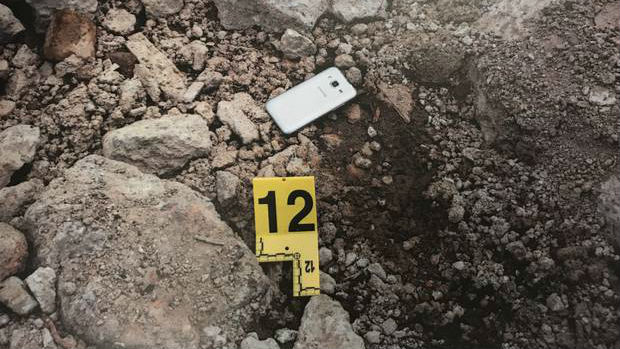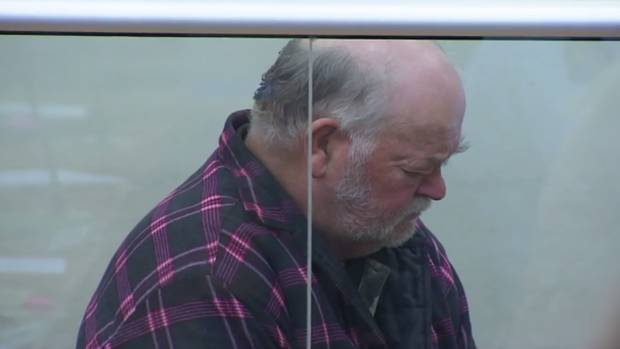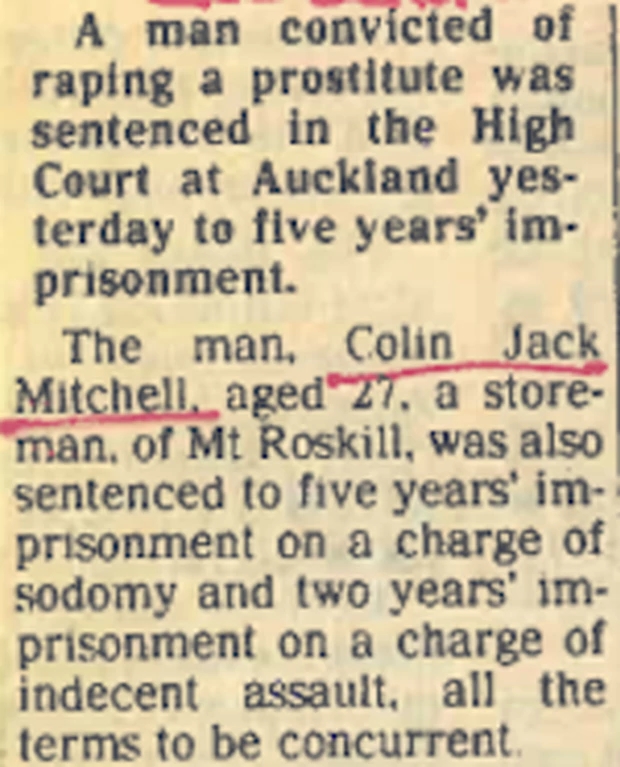Colin Jack Mitchell is the man who abducted, wounded and assaulted a 23-year-old woman at a West Auckland quarry, intending to sexually violate her - threatening to kill her.
A jury decided that yesterday after deliberating for six hours following a 12-day trial in the High Court at Auckland.
That jury also found Mitchell guilty of raping a woman in May 1992 - a crime that he was tried for after DNA evidence found in the quarry attack linked him to a historic sex crime.
READ MORE: Guilty verdict in Riverhead kidnapping case
READ MORE: Riverhead quarry trial: Emotions run high after guilty verdict
But the Herald has not been able to report on that until today.
Suppression orders prevented the details of the 1992 attack from being published.
The orders also prevented the Herald from revealing that Mitchell has a previous conviction from the 1980s for rape.
Today, we can finally tell you everything about Mitchell - a seemingly nondescript Onehunga truck driver by day and a prowling, violent rapist by night.
Soon after Mitchell appeared in court charged with the Riverhead quarry attack police were contacted by another Auckland woman.
She said Mitchell had raped her in 1992.
She had reported the rape to the police, but always felt they didn't believe her.
Her case went effectively uninvestigated and remained unsolved.
Until she saw a photograph of Mitchell in the news.
Mitchell's DNA was found on and in a glove at the Riverhead scene, and when police ran that through the national database they got a hit.
His DNA was also found on the body and clothing of a woman who was raped in 1992.
Police charged Mitchell in relation to the rape and successfully sought to have that set of charges tried alongside the Riverhead attack charges in the High Court at Auckland.
Mitchell pleaded not guilty to six charges - three relating to Riverhead and three relating to the 1992 rape.
Despite his denial of the offending, the jury found him guilty on all counts.
The attacks were significant in their similarities - from where Mitchell took his victims, to what he said during the violations and how he reacted when the women refused to comply with his disgusting demands.
The Crown was also able to call "propensity evidence" - meaning they could tell the jury about Mitchell's prior conviction.
WHAT IS PROPENSITY EVIDENCE? CLICK HERE FOR MORE INFORMATION.
Jurors are not usually given information about the previous criminal offending of a person on trial, but in Mitchell's case the Crown argued it was necessary, that it showed his propensity to act in a particular way.
Until today, publication of any of this information has been prohibited.
So, while the Herald reported on the Riverhead quarry charges the jury were hearing so much more about Colin Jack Mitchell.
"Most of the time Mr Mitchell is a law-abiding citizen," Crown prosecutor Kirsten Lummis told the jury on the first day of the trial.
He was the president of the Onehunga RSA, a truck driver who'd worked for the same company for 20 years.
"But Mr Mitchell also has a dark sinister side, a side that only comes out in the dark of night," Lummis said.
"At night, Mr Mitchell turns into a prowler, picking up women - young women - on their own late at night."
1992: 'He was just horrible'
"You're hearing about this as the case has significant similarities," Lummis told the Mitchell jury before she detailed the 1992 attack.
It was May 30 - a Saturday - and a 25-year-old West Auckland mother made her way into Ponsonby.
Her destination was the Gluepot Tavern at the Three Lamps intersection - a popular venue for gigs and the launch pad for some of New Zealand's finest rock and pop musicians.
In its day, it also hosted public and private performances by some top international acts visiting the country, including the Rolling Stones.
The woman was excited to see a Blues Brothers cover band, so much so that when her friends dropped out one by one, she decided to go alone.
Besides, she had a babysitter organised, it would have been a waste not to go.
She bussed into the central city and then up to Ponsonby and, as expected, had a blast at the Gluepot.
She had one drink, no more.
The woman planned to get a taxi home and had put $20 in her jacket for that purpose, but when she went to leave the cash was gone, lost.
She decided to walk home.
It was an almost 13km hike and the night was cold - but she had no choice, and she reasoned that she probably needed the exercise.
She walked along Ponsonby Rd, then down Great North Rd past Western Springs and towards Point Chevalier.
A man pulled over and offered her a ride but she turned him down
"He seemed a little bit rough around the edges, I just didn't think I wanted to take the ride, didn't feel comfortable with it," she told the jury while giving evidence in person during Mitchell's trial.

Colin Mitchell gives evidence during his trial in the High Court at Auckland.
Consensual sex? Hell no
The woman was taken to the police station, interviewed and sent for a medical assessment.
Unfortunately, things did not go well for her with the police.
She felt that they did not believe her, that they were not interested in her complaint - that they didn't want to help her.
So, she lied.
She wanted to get out of there, to get home to her kids, so she told police that the person who gave her a ride to Rosebank Rd was a woman.
She didn't tell the truth about the man because at that stage, she did not think he was the same person that had raped her.
"I was scared, I think i was in shock a little bit, I was incredibly embarrassed," she explained to the jury.
"I was embarrassed because I was a victim and I had never, ever been a victim.
"I was used to going where I wanted, doing what I wanted, walking where I wanted and it being okay - and all of a sudden it wasn't.
"To be honest the police weren't very sympathetic, they weren't very accommodating - I had the feeling that they weren't believing what I was telling them, that I had done something stupid and had therefore paid the price.
"I wasn't happy with being there, I really just wanted to go home ... I just didn't want any more judging."
Had she believed the man who picked her up was her attacker, she would have told police everything, she said.
After that night at the police station her complaint never progressed.
Her rapist was never caught and she moved on with her life.
Then in March 2017 she saw a face in the news that would take her right back to that day in 1992.
A terrifying blast from the past
When she saw images of Colin Jack Mitchell in the dock at the Auckland District Court, charged with the Riverhead quarry attack, she knew immediately who he was.
He was the man who had picked her up all those years ago.
She had never, in 25 years, told the police about her lie, that it wasn't a woman who picked her up.
But in March 2017 she contacted them and told them everything.
By then police had DNA matching Mitchell's from a glove found at the Riverhead crime scene.
It matched DNA taken from the woman in 1992.

Mitchell was charged with her rape. Finally.
In court he did not deny giving the woman a ride that night, did not deny sexual contact with her.
But he did deny any criminal offending against her.
His story?
He met her at the Gluepot and offered to drive her home.
On the way they stopped behind a building on Rosebank Rd and had sex - consensual sex.
Afterwards, Mitchell drove away and left the woman there, which annoyed her.
She couldn't be bothered walking home and called the police to accuse him of rape, in part to spite him and in part to get a free ride to her house.
When this was put to the woman in court by defence lawyer Mark Ryan, who accused her repeatedly of lying to the police and the jury about her encounter with Mitchell, her answer was simple and clear.
No.
"Hell no.
"I lied to police because I was incredibly uncomfortable, being made to feel like I was an incredibly stupid girl … they weren't very nice, they were treating me like I was a criminal, like I was the person to blame," she said.
"It was definitely not consensual, most definitely not."
After hearing the Crown case against Mitchell, and his defence of consent and lies from the victim, the jury of eight women and four men made their decision.
He was guilty.
Guilty of kidnapping the woman with intent to have sexual intercourse with her.
Guilty of sexual violation by unlawful sexual connection.
Guilty of sexual violation by rape.
1984: Rape in the rail yard
Guilty is a word Mitchell knows well.
The Herald can now also reveal that when he was 27 he was jailed for five years after he was convicted of rape, sodomy and indecent assault.
He was jailed on July 13, 1985 - almost a year to the day after the vicious attack.
The jury in this month's trial were told about the historic conviction, the Crown saying the similarities between that offending, the quarry attack and the 1992 incident were significant and showed a terrifying and dangerous pattern.
July 23, 1984 was an ordinary Monday night at work for a 18-year-old prostitute - until she crossed paths with Mitchell.
He pulled up on Queen St and the woman got into his car, believing he was a client.
They discussed what sexual services she offered and agreed on activities short of full intercourse.
He drove her to a secluded spot at a Mount Eden railway yard, stopped the car, and turned on her.
He became violent, grabbed her by the throat and forced her to strip off her clothes and perform oral sex.
He raped her.
He sodomised her.
He went through her bag, then threatened her and then drove off into the night - leaving her alone, injured and traumatised in the dark, cold yard.
At sentencing the presiding Justice said that alongside the offending, Mitchell's choice of victim was a concern.
"The victim had been easily approachable and a person who could be thought to be reluctant to complain, so lessening the risk of an offender being apprehended," he said.

A Herald story from 1985 detailing Mitchell's rape conviction
Take your Radio, Podcasts and Music with you











